Developing Competency Frameworks for the Public Service
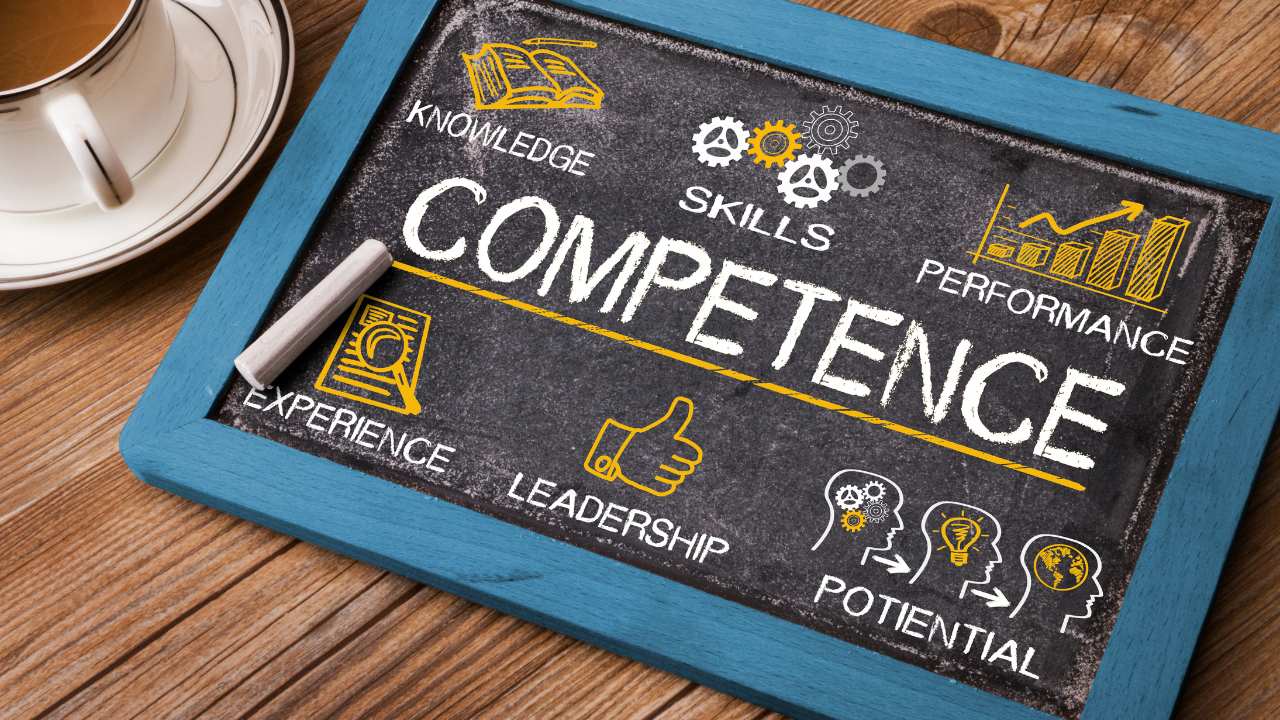
Description: As external Lead Consultant, I partnered the Project Sponsor in developing a Public Service-wide functional Competency Framework. The establishment of a functional competency framework contributes to Public Service effectiveness by providing a clear, consistent approach to managing and developing talent.
Stakeholders: There are estimated more than 9,000 Public Service Officers holding primary and secondary roles in this job function.
Responsibilities: Lead Consultant, Project Management, Job Analysis, Focus Groups and Stakeholder Consultation, Data Analysis.
Duration: 2021 to 2022 (About 10 months)
PROBLEM:
In the Public Service, the absence of a comprehensive functional competency framework will lead to inconsistencies in talent management, affecting areas such as recruitment, performance assessment, employee development, and succession planning.
Consequently, this will negatively impact the Public Service's ability to achieve its mission and maintain a high level of service quality, resulting in reduced efficiency, employee engagement, and overall organizational effectiveness.
SOLUTION:
As a team of four (4) officers, we were engaged as external Consultants to a Public Service Functional Leader to develop a service-wide competency framework that affects more than 9,000 officers. Developing a comprehensive competency framework supports the Public Service’s push for competency-driven growth through a structured system that outlines the skills, knowledge, behaviors, and attributes required for individuals to perform effectively in their roles.
PROCESS:
As an external consultant partnering a government ministry to develop a competency framework, the process typically involves several stages. We developed this approach as part of a 3 phase process with the following steps:
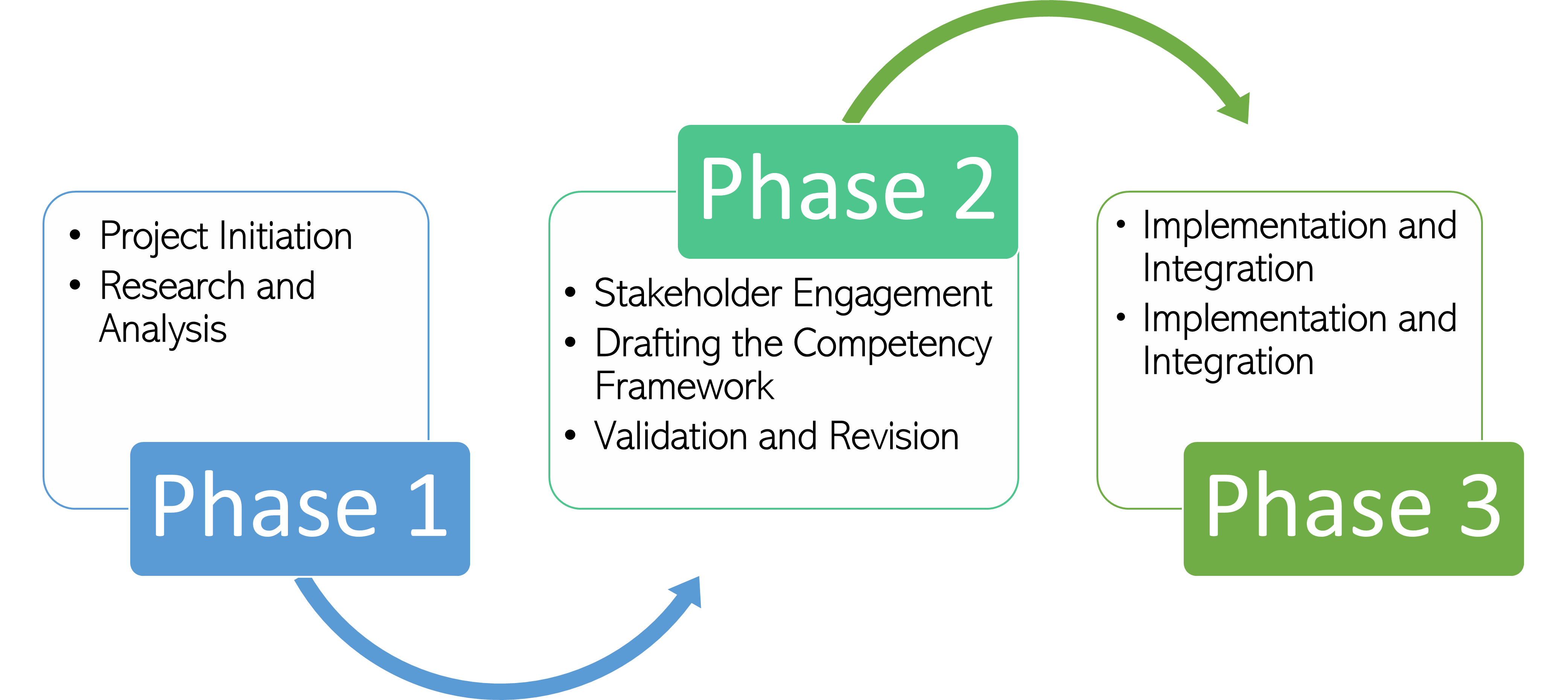
PHASE ONE
PROJECT INITIATION:
We met with the Project Sponsors in August 2021 to discuss the project's objectives, scope, and desired outcomes. At this stage, I was a team member supporting another Lead Consultant (who left in Dec 2021) on this project. During this meeting with the Project Sponsor, we established communication channels, clarified roles and responsibilities. This included identifying the POCs (Point-Of-Contacts) at working-level, developing a project timeline as seen below:
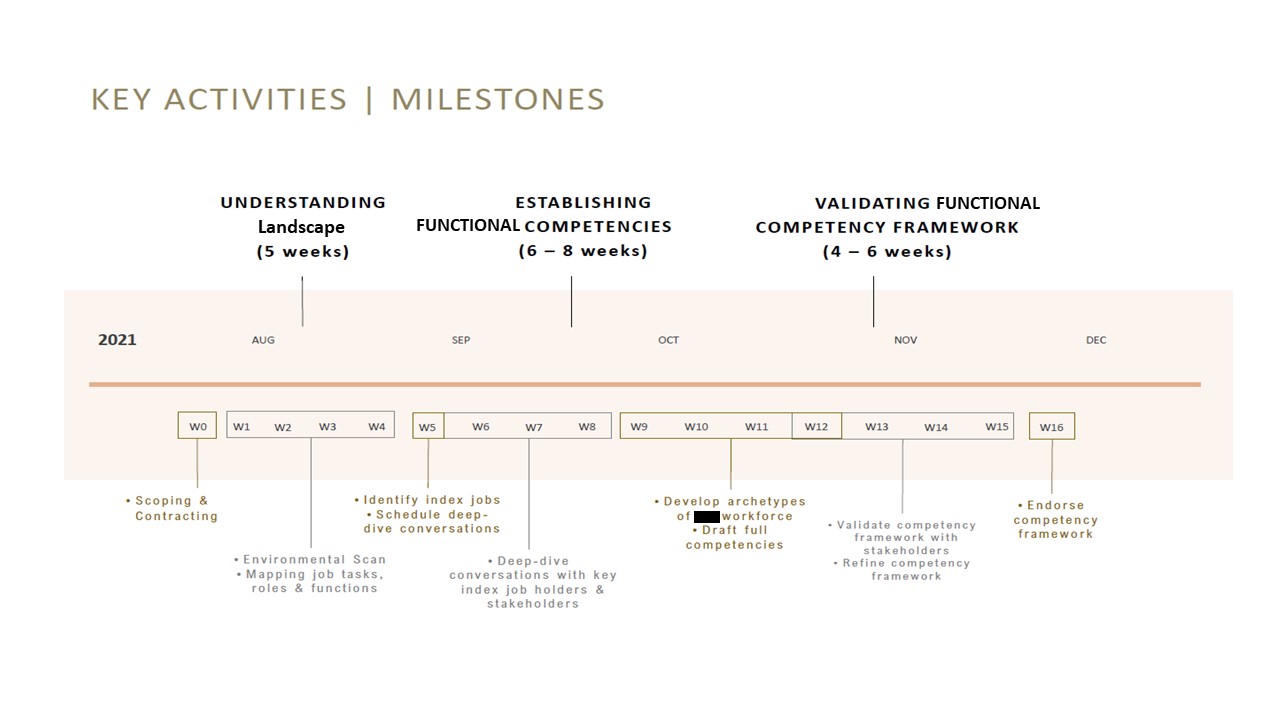
RESEARCH AND ANALYSIS:
As part of our environmental scan, we reviewed relevant documentation, such as organizational charts, job descriptions, and strategic plans. We conducted a thorough analysis of the various functions, roles, and responsibilities by obtaining Job Descriptions of functional jobs across the Public Service. In total we analysed more than 200 Job Descriptions across different seniorities.
We also studied best practices and competency frameworks from other functions, sectors as well as international benchmarks. As part of our study, we focused on the Skills Framework developed for the Singapore workforce by Skillsfuture Singapore [Link]. We made referenced against International Benchmarks such as the Australian Public Service Academy (APS Academy) and the Government of Canada. The culmination of the environmental scan was a Landscape Scan report that was sent to the Project Sponsor to close off Phase 1.
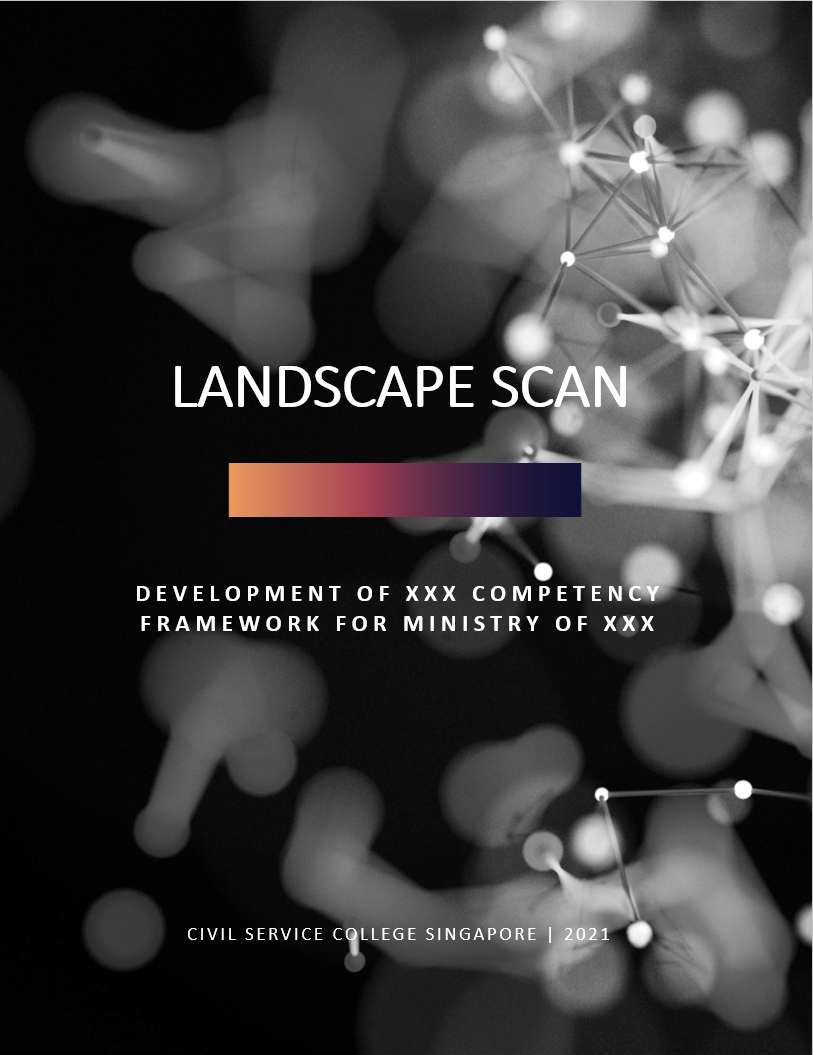
PHASE TWO
STAKEHOLDER ENGAGEMENT:
During this phase, we engaged ministry stakeholders, including senior leaders, managers, supervisors, and employees, through interviews and focus groups to gather insights and input. We designed lines of inquiry to identify key competencies, skills, knowledge, and behaviors required for each role, with input from subject matter experts and stakeholders. In total we conducted 14 Interviews with Senior Leaders and Index Job Role Holders and 3 Focus Group Discussions (FGDs). I designed the lines of inquiry for the interviews (where I was lead) and designed the facilitation plan for the FGDs. In total, I led 6 out of the 14 interviews and was Lead Facilitator for 2 out of the 3 Focus Group Discussions.
Following the data collection, we held sessions to sense-make the data to identify themes based on affinity.
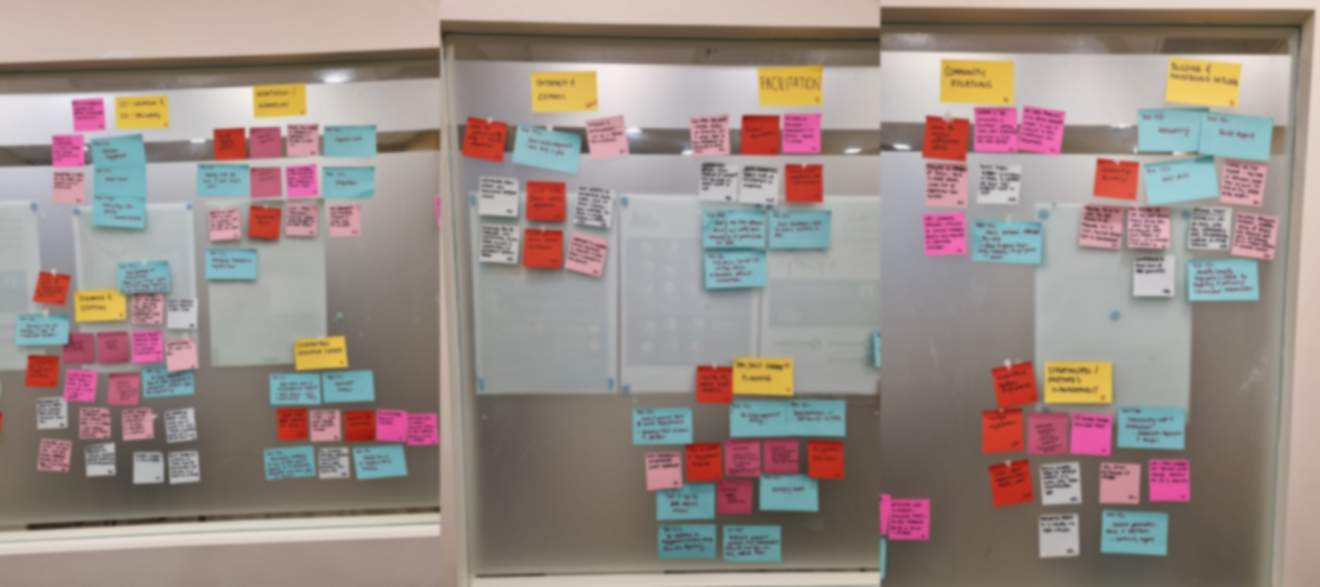
DRAFTING THE COMPETENCY FRAMEWORK:
Based on the research and stakeholder input, we developed the draft competency framework, outlining the key competencies for each role and the behavioural indicators for each proficiency level. We also structured the framework according to the desired format, such as competency clusters, and ensured alignment with the Project Sponsor’s mission, values, and strategic objectives.
We also started drafting the illustrative Role Profiles that will be a support aid for the Competency Framework. In developing the jobs profile, we took data from the job analysis conducted in Phase 1 to map the key competencies, skills, knowledge, and behaviors required for each illustrative job role, ensuring alignment with the functional competency framework.
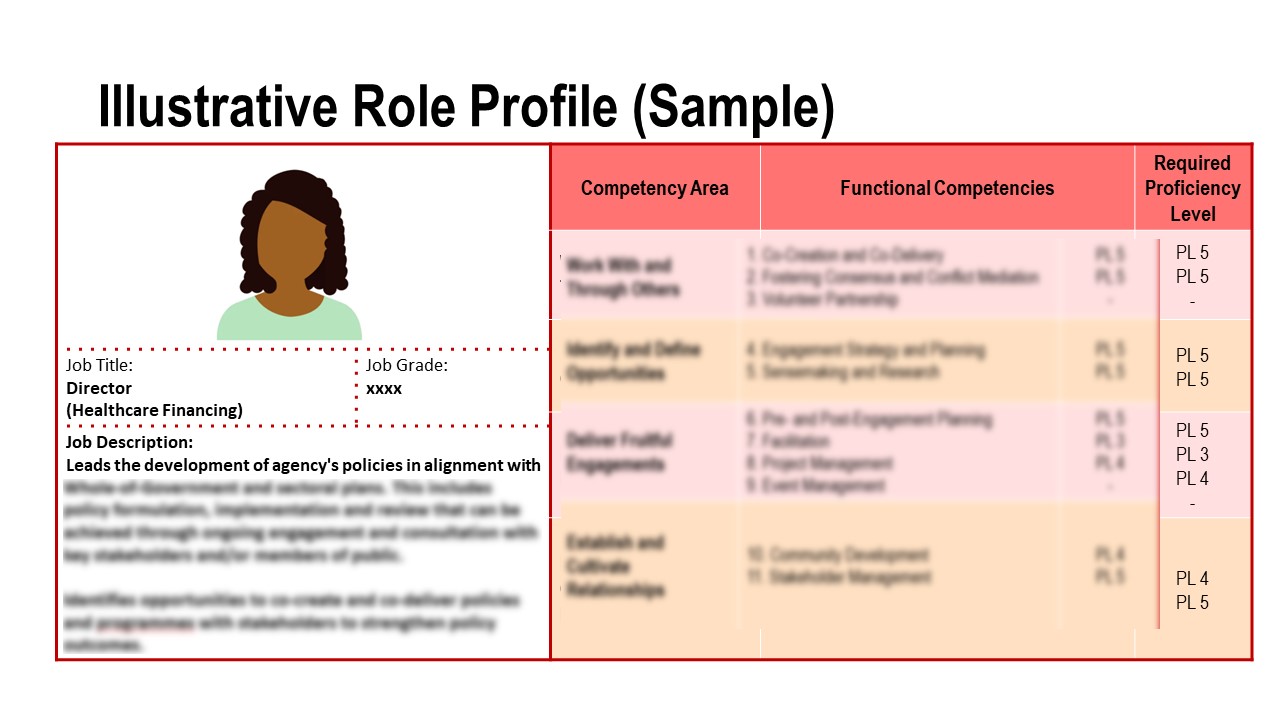
VALIDATION AND REVISION:
As Lead Consultant, I presented the draft framework to the Project Sponsors for review and feedback. We facilitated four (4) validation focus groups to gather additional input and ensure the framework and illustrative role profiles were accurate, relevant, and comprehensive. Thereafter we revised the framework based on the feedback received and finalize the documents before obtaining Project Sponsor’s final signoff in July 2022.
PHASE THREE
Within Phase 3 there are two segments namely “Implementation and Integration” as well as “Evaluation and Continuous Improvement”. These two segments will be done after the Functional Competency Framework has been utilized for at least 12 months. A review will be conducted to monitor the implementation process and address any challenges or concerns that may arise when officers refer to the competency framework in their career development.
RESULTS AND TAKEAWAYS:
Over the course of this project, one significant challenge I faced was in scheduling and coordinating interviews and focus group discussions (FGDs). As these activities involve the participation of multiple stakeholders, such as Senior Leaders, supervisors, and individual contributors across the Public Service, coordinating schedules and finding mutually convenient times can be quite demanding.
In addition, ensuring that diverse perspectives are represented and balanced requires careful planning and communication. Moreover, the quality of the input collected during these sessions can be influenced by various factors, such as participant dynamics, time constraints, and the Interview/ FGD facilitator's ability to engage and guide discussions. We’ve had many instances where FGD participants dropped out early or completely due to conflicting meetings.
Another set of challenges revolves around managing project sponsors and the iterative nature of competency framework development. Keeping project sponsors updated and engaged throughout the process is critical for securing their support and maintaining alignment with organizational goals. This involves regular communication, progress reporting, and addressing any concerns or changes in project scope.
Furthermore, competency frameworks often require multiple revisions based on stakeholder feedback and changing organizational needs. This iterative process can be time-consuming and requires a high level of flexibility, attention to detail, and responsiveness to feedback. In the end the project was delayed by more than 3 months because of these issues. Balancing the need for thorough revisions with project timelines and resource constraints can be particularly challenging, as we strived to develop a robust and accurate framework that meets the needs and expectations of all stakeholders.

LESSONS:
For future projects, these are the following changes I’ll make:
1. I’ll fully utilize digital scheduling tools and prioritize stakeholder availability to streamline interview and focus group coordination, ensuring diverse perspectives are captured efficiently.
2. I’ll establish a regular progress reporting with project sponsors, fostering engagement and alignment with their goals throughout the project.
3. Lastly, I’ll implement a structured feedback process with specific milestones for revisions, allowing for more effective management of iterative competency framework development while maintaining project timelines.
NEXT STEPS:
The functional competency framework was launched in Oct 2022 and was piloted first for development purposes i.e. training. A review will be conducted in 2023/ 2024 to evaluate the effectiveness of the competency framework after which there are hopes that the framework can be used for Performance management, Talent identification and development, Recruitment and selection, Workforce planning and optimization.